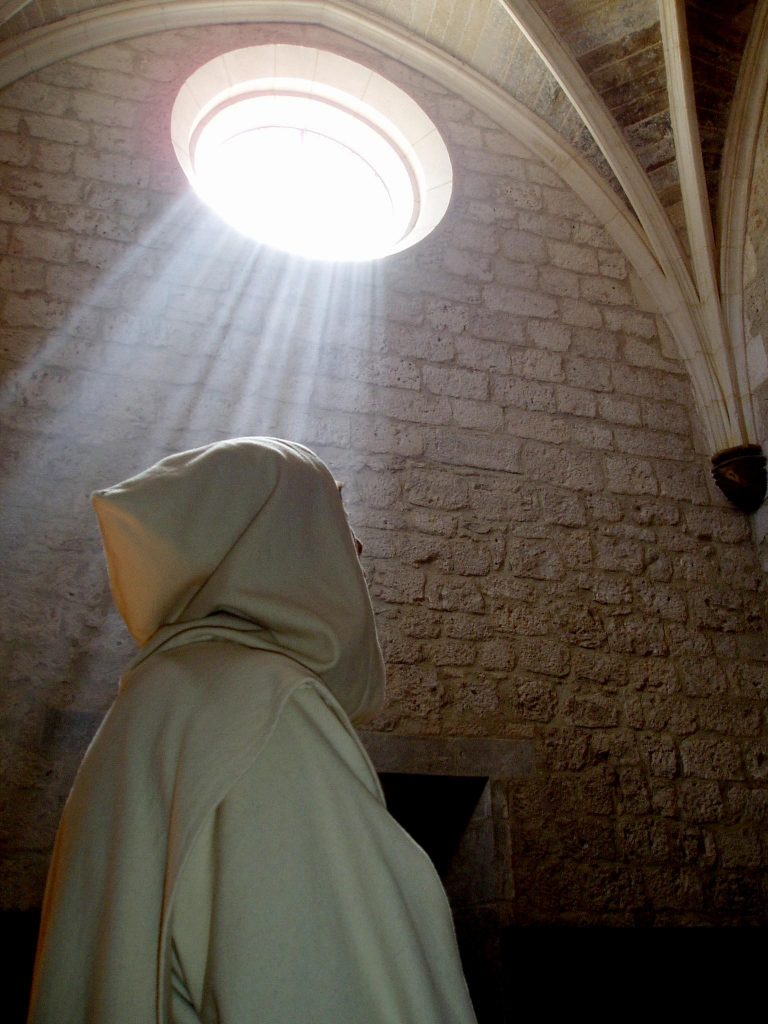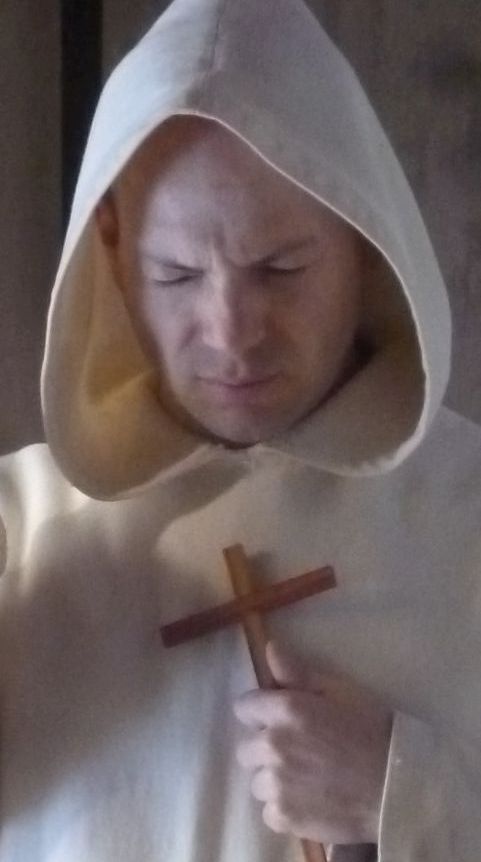Triptych
1st part: The fundamental orientation
The essence of Christian life is love, the love of God and the love of men, united to Christ and living through him. Some express their charity through apostolic works. There are also men and women who dedicate themselves solely to God in the contemplative life.

God calls freely whom he wishes. It is an intimate invitation to share his whole life with him, to follow him closely. Sometimes this is unavoidable and radical: “You have seduced me, Lord, and I have let myself be seduced; you have overpowered me: you were the stronger” (Jer 20:7). Those who have experienced God’s love will seek to respond to his love.
A small group sharing the same vocation, in which each one lives in great part alone; the monks are united under a prior and gather three times a day for the Holy Eucharist and for singing the Liturgy of the Hours. They pursue tirelessly their quest for God, either in cell or the workshops or the fields. This is their vocation, this is what brought them to this place.
Attracted by the vast interior expanses, they have chosen this solitude, in which they willingly impose important restrictions on themselves, with the sole aim of being more open to the absolute of God and the charity of Christ. Stabilised in this place, quite away from the world, they lead a poor and simple life, obedient in everything, celibate like Christ their Lord, for a greater openness to the gifts of salvation and fraternal communion.
They listen constantly, in prayer and meditation, to the call to do better, to be more. The Word of God fills their silence. By their renouncement and work they associate themselves with all those who labour, wherever they may be. In the depth of their hearts, they are drawn towards ever more distant horizons, where only the image of God in Christ, crucified but alive, the hope of their glory, can be seen.
Thus, in the very heart of humanity, but hidden from the world, they are the ineradicable memory of its divine origin, the constant reminder of a spiritual destiny for all men, the safeguard of a personal freedom that is increasingly threatened and stifled, the burning desire for the Eternal, the guarantee of an infinite interior progress, though circumscribed in a reduced space: confined to the solitude of the hermitage and the cell to better flourish in the Heart of God.
2nd part: The place of purification
“God opposes the proud, but gives grace to the humble” (1Pet 5:5). The desert is a purifying fire.
In solitude all that we really are comes to the fore. All the pettiness we have allowed to creep into us becomes manifest, all the evil dwelling in us is revealed. We discover our own misery, our deep weakness, our visceral powerlessness.
Here it is not possible to hide the tricks we use to conceal those aspects of ourselves that we dislike and that are so far from the desire of the One who sees all and penetrates all. It becomes evident that we justify ourselves too easily by considering our defects as character traits.

Here we become vulnerable; there is no escape. There is no distraction that cushions, no excuse that exempts. It is impossible to avoid coming face to face with the deep reality of who we are, to look away.
Here the false constructions crack, all those walls we have built to protect ourselves. Who knows how often we seek to deceive ourselves, as much and more than others! But the claim to know divine realities dissolves before the One who remains the All Other.
It is a steep path, in the dark, groping, guided by faith alone, but it is a path of truth. All our personal securities will remain clinging to the thorns of the path and will leave us with this one certainty: of ourselves, we can do nothing.
This is where God is waiting for us, for only an empty vessel can be filled and if He wants to fill us with Himself He must first strip us of what encumbers us. To create an infinitely delicate work, the divine Artist needs a material without resistance. Then, from our misery His hand will be able to create wonders that will remain hidden from our eyes. All our joy will be to let ourselves be transformed by Him whose name is Love.
3rd part: The work of grace
The soul to whom it has been given to despise the world and to despise herself to the point of self-forgetfulness, to which it has been given – in other words – to hold for nothing that which is not, this soul stripped of herself sees divine Wisdom take the place of herself. Every created image and every limited wanting having been erased by the successive trials which have purified her, she becomes this spotless mirror of which Solomon speaks (Wis 7:26). The Father contemplates himself there, flooding her with his glory and the ardour of his love.
The “devotions” in which the powers of the soul are more or less dispersed at the beginning of a life of prayer, boil down to one way. The “practices” come down to a single act, accepted rather than produced, of immense value, for it is of a divine order. It consists in letting God be in ourselves. We can call it charity, faith, trust, worship, propitiation, thanksgiving. All the words are synonymous and their concepts seem to melt like substances on fire, in the crucible of the dazzled heart in which subsisting Love itself burns.
When a being reaches his perfection by returning to his principle, he not only finds for himself the abundance of life but he saves other beings by communicating to them this life which he draws from its source.
By acting only in God and for God, the man of prayer is at the very centre of the hearts and communicates to all the fullness of grace he has received. “He who believes in me, out of his heart shall flow rivers of living water,” says our Lord. “This he said,” adds Saint John, “about the Spirit, which those who believed in him were to receive” (Jn 7:38-39). Being perfectly man, he sees the desire of humanity fulfilled in himself: to be united with Christ. In a way, he himself becomes the Beloved, the desire of the everlasting hills.
He who has lost himself in the embrace of the divine essence, who lets himself be engendered with Jesus according to the Father’s will, participates in the spiration of the comforting Spirit and himself becomes a comforter. He gives to souls, without looking aside, the eternal joy that inebriates him, he gives light and warmth to the world because he cares only for God.
No doubt these things will appear foolish to the wisdom of the world, because the world lives on perishable appearances, and we are talking about pure and eternal reality. Its ways are not ours, our thoughts are not its. Still a little while and the expectation of the whole creation will be fulfilled by the glorification of the sons of God.
To reach straightforwardly the source of all fruitfulness – which is found on the heights of contemplation – the Carthusian monk descends to the depths of his nothingness, where by continual renunciation he fully dies to himself and to the world, and thus realizes his splendid ideal: to live by God in solitude.
O Bonitas!

